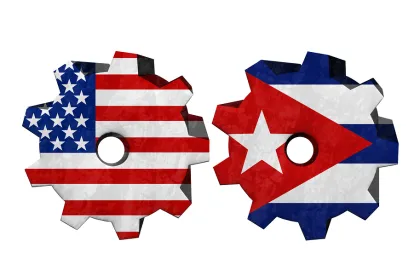As a new presidential administration settles in, we have developed several recommendations for undoing President Trump’s isolationist policies and effectuating meaningful changes to U.S.-Cuban relations without Congressional involvement.
In Part 1 of this two-part series, we offered proposals to improve family and economic connections; today, we address legal and bilateral concerns.
Suspend Title III of the Helms-Burton Act allowing lawsuits against U.S. and foreign entities
The Cuban Liberty and Democratic Solidarity Act (Libertad) Act (the “Helms-Burton Act” or the “Act”) created a federal cause of action in U.S. court against any person who “traffics” in Cuban “property” that was “confiscated” from a U.S. national. The Act authorizes claims by persons who were U.S. nationals at the time of expropriation, and by persons who were Cuban nationals at the time but later became U.S. nationals. Since the passage of the Helms-Burton Act in 1996, every U.S. president has suspended Title III, partially due to opposition from European allies.
In April 2019, the Trump administration announced that it would no longer suspend Title III, paving the way for thousands of potential lawsuits by plaintiffs with claims to expropriated Cuban property. The purpose of the action was to pressure foreign investors to cease doing business with Cuba. In practice, however, the vast majority of lawsuits have been filed against U.S., rather than foreign, companies (due in part to jurisdictional hurdles to filing suit against foreign entities in U.S. court), causing legal and financial issues for U.S. companies who are not actually present in Cuba. It is not clear what effect, if any, reinstating the suspension would have on pending litigation, but the Biden administration could avoid further harm to U.S. businesses by promptly reinstating the suspension of Title III.
Re-staffing the U.S. Embassy in Havana
The Trump administration ordered the departure of all non-emergency personnel from the U.S. Embassy in Havana in September 2017 after embassy employees suffered from vertigo, headaches, and other mysterious injuries from an unknown source. The consequences of this move have been far-reaching. The lack of physical presence of U.S. Embassy representatives in Cuba has made effective communication between the two countries even more difficult. Indeed, continued engagement and collaboration between the U.S. and Cuba at all levels has declined. For example, an increasing number of Cuban scientists and medical professionals have been unable to travel to the U.S. for meetings and exchange programs because they now must travel to third countries to obtain U.S. visas—an insurmountable obstacle for many Cubans.
Decisions regarding embassy staffing fall within the President’s executive powers, and thus do not require Congressional approval. Biden can reset the tone for U.S.-Cuba engagement, reopen chilled channels of communication, and facilitate continued collaboration between the countries by promptly restaffing the embassy and reinstating visa services.




 />i
/>i

